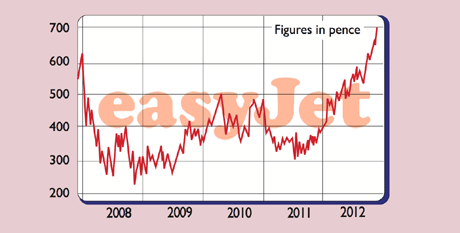
Airlines rarely make good investments. Stelios’s creation is an exception, says Phil Oakley
The business
EasyJet is one of Europe’s best-known and largest airlines. It has an 8% share of the European short-haul market and flies passengers on more than 600 routes to most of Europe’s major cities plus selected destinations in north Africa. The company has a very strong presence in the key markets of the UK, France, Italy and Spain.
EasyJet is a low-cost airline – it passes on savings from its efficient business model to customers in the form of lower fares than traditional national airlines (the flag carriers). It has a fleet of 214, mainly Airbus, aircraft and owns around 70% of them. To generate the best returns they have to be in the air for more than ten hours a day. In the year to September 2012, easyJet carried more than 58 million passengers and had sales of £3.8bn.
The history
The airline was founded in March 1995 by Stelios Haji-Ioannou (better known these days as just Stelios), a Greek-Cypriot entrepreneur. It started out with just two Boeing 737 aircraft based at Luton airport. In November of the same year it started flying to Glasgow and Edinburgh with tickets selling for as little as £29 for a one-way trip. The following year saw the firm start flying to Amsterdam, Nice and Barcelona. In 1997, it opened a second base at Liverpool and started selling tickets over the internet. By the late 1990s, it was carrying more than one million passengers a year. In 2000, the company was listed on the London Stock Exchange.
Over the next decade the company expanded rapidly by establishing new bases across Europe and buying other airline companies – most notably Go, the budget airline that was set up by British Airways. By 2010, easyJet had created a thriving pan-European business and became the UK’s largest airline.
EasyJet’s name has always been synonymous with its founder Stelios. Although he is no longer a director of the company, he and his family still own more than a third of its shares. This means he tends to interfere with the running of it. In recent years, he’s publicly criticised the chief executive, tried to get the chairman sacked and demanded big dividend payments. He hasn’t always got his way, but some investors have found his influence unsettling. That said, he has created a good business. Unlike British Airways, easyJet has managed to remain consistently profitable during its time as a quoted company.
The chief executive
Carolyn McCall has been chief executive since 2010, having had no previous experience of the airline industry. She started out as a schoolteacher, but quickly gave that up to move into the media. McCall climbed the ladder at Guardian Media Group over 20 years, becoming chief executive in 2006. Called “an old media luvvie” by Ryanair’s CEO Michael O’Leary on her appointment at easyJet, she seems to be doing a good job. She was paid £1.5m last year.
Should you buy the shares?
Airlines rarely make good investments. Up until quite recently, cheap money has meant that it’s been relatively easy for new companies to start up and for existing ones to buy more planes. Lots of competition has meant that there has often been too many seats chasing too few passengers. Throw in higher fuel costs, weak economies and higher aviation taxes and you can see why many airlines yo-yo between profits and losses.
But the current economic climate might just put a stop to this madness. The big national carriers are struggling and need to cut back. This should mean capacity and competition on easyJet’s main routes is unlikely to grow. It’s also very difficult for airlines to get their hands on the money to buy new planes. EasyJet’s key strength is that it has a business model that can thrive in these tough times. It flies to Europe’s main cities, but importantly to its main airports too. This makes it a viable option for business travellers looking to save money, especially since it now has allocated seating, which gets rid of the usual scramble to get on board. People still want to go on holiday despite the growing strain on household budgets. That should mean good demand from tourists.
EasyJet’s numbers look very impressive too. Unlike many of its peers, the firm has impeccable finances with virtually no debt on its balance sheet. It is true that it has to cover the lease costs on about 30% of its fleet, but its decent profits and cash flow mean that this is currently not a problem. It fills nearly nine out of every ten seats on its planes and makes decent returns on its assets. Eighty per cent of its fuel bill is hedged for the next year and £35m of costs is being taken out.
With the company adding just over 3% to its capacity, we think that sales and profits should keep on growing. Unusually for an airline, shareholders should see a decent chunk of these profits coming back to them. Thanks to Stelios’s constant badgering, the directors of easyJet have decided to pay out one third of its net profits in dividends every year. With the shares trading on just over ten times 2013 expected earnings and offering a dividend yield of over 3%, we think they are still good value.
The numbers
Directors’ shareholdings
C McCall (CEO): 13,954
C Kennedy (FD): 13,985
M Rake (chairman): 11,282
What the analysts say
Buy: 19
Hold: 5
Sell: 3
Average price target: 680p
Key facts
Stockmarket code: EZJ
Share price: 693p
Market cap: £2.7bn
Net assets (Sept 2012): £1.8bn
Net debt (September 2012): £74m
P/e (current year estimate): 10.6 times
Yield (prospective): 3.30%
Interest cover: 13.7 times